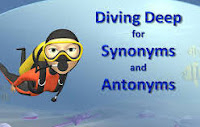Lesson Plan of Synonyms and Antonyms English Grade 3
Lesson Plan of Synonyms and Antonyms
English Grade 3
Students’ Learning Outcomes
·
Recognize and use words similar and
opposite in meaning
·
Information for Teachers
·
Similar means having same
meanings.
They are also called synonyms.
·
Opposite words are also
called Antonyms.in grade 111, we use direct opposite e.g. big/small, old/new,
dirty/clean etc.
·
Opposite are often adjectives
as they describe (words) e. g. old book, small cat etc.
Material / Resources
Board, chalk/marker,
worksheet, charts, textbook.
Worm
up Activity
·
Ask the students randomly to tell anything about
the following:
·
Big in the class / anything small in the class.
·
Clean in the class / anything dirty in the
class.
·
Dull / black / white / colorful in the class.
·
New in the class / anything old in the class.
·
After this activity, tell the students that they
will learn some similar and opposite words.
·
Development
Activity 1
·
Write the
following words on the board.
·
Old, long,
difficult, big, hard, tall, heavy, new, small, beautiful, cold, short.
·
Ask the
students to work in groups and tell the words and their opposite from the given
list of words.
·
Once the
students have done with the opposite, discuss similar meanings of the words
with them. Let the students guess.
·
Help when
required.
·
Ask the
students to note down the similar and opposite meaning words in their notebooks
side by side.
·
Activity 2
·
Write the
following activity on the board.
·
Find the
word next to it that is the synonym.
1.
Bad; awful,
silly
____________________________________________
2.
Pretty;
beautiful, ugly
______________________
3.
Thin; fat,
lean
_____________________________
4.
Big; large,
small
________________________________
5.
Talk; speak, silent
___________________________
6.
Wet; dry,
soaked
____________________________
7.
Quick; slow,
fast
_________________________
8.
Glad; happy,
sad
___________________________
·
Draw three
columns on the writing board and ask the students to draw the same in their
notebooks e. g.
Words
|
Similar meaning words
|
Opposite meaning words
|
big
|
large
|
small
|
·
Ask the
students to guess the meanings of difficult words in pairs.
·
Ask them
randomly about the meanings of the difficult words.
·
Ask them to
write similar meaning words and opposite meaning words in respective columns.
·
Tell them
to note the words and meanings side by side on their notebooks.
·
Once they
understand all the meanings, ask them to put them in the columns accordingly.
·
Take rounds
to monitor and help the students, where required.
Sum up / Conclusion
·
Conclude the
lesson by asking the students:
What are synonyms? Given example:
What are antonyms? Given example:
Assessment
·
Assess students’
performance through activity 1 and 2.
·
Take a
round and ask students about their scores.
·
Involve the
students in solving problems given in exercise at the end of unit/chapter.
Follow up
·
Ask the
students to consult a dictionary to find out opposite or similar meaning words
of the following:
Old long difficult
Big hard tall
Heavy fast small







Comments
Post a Comment